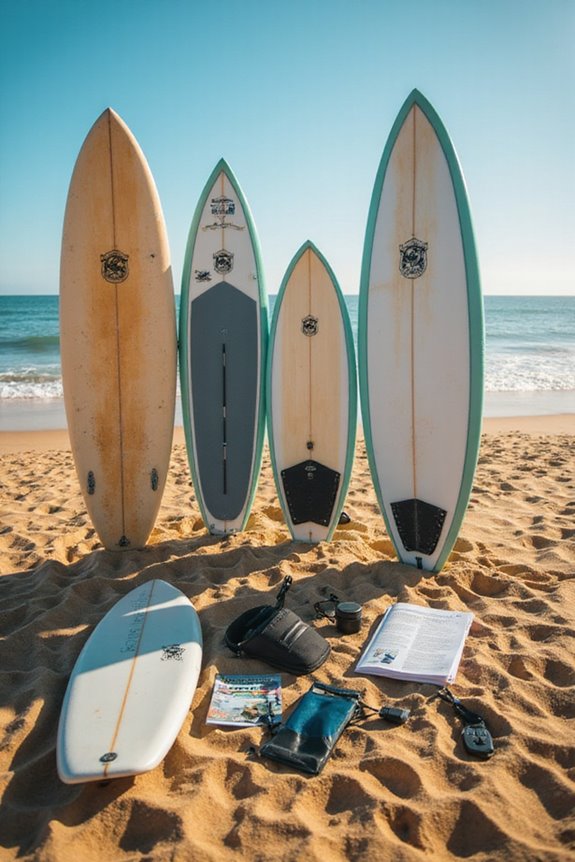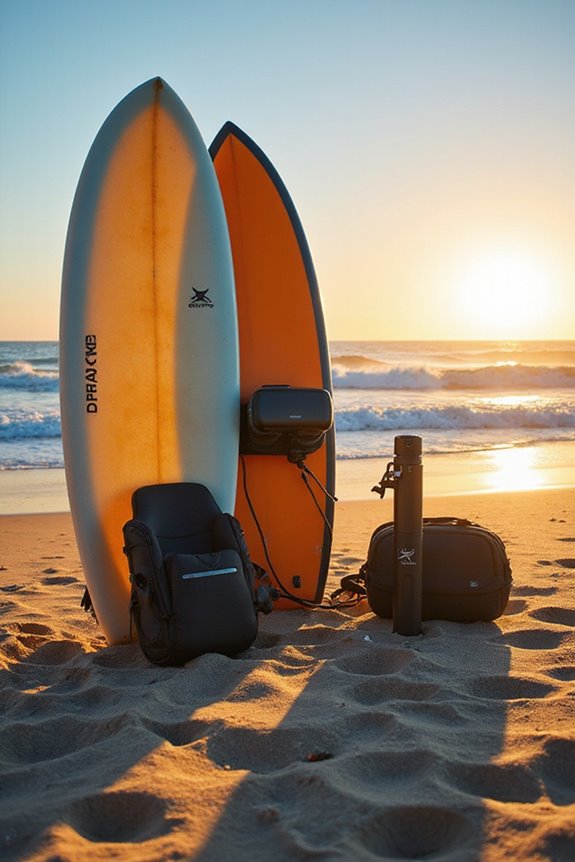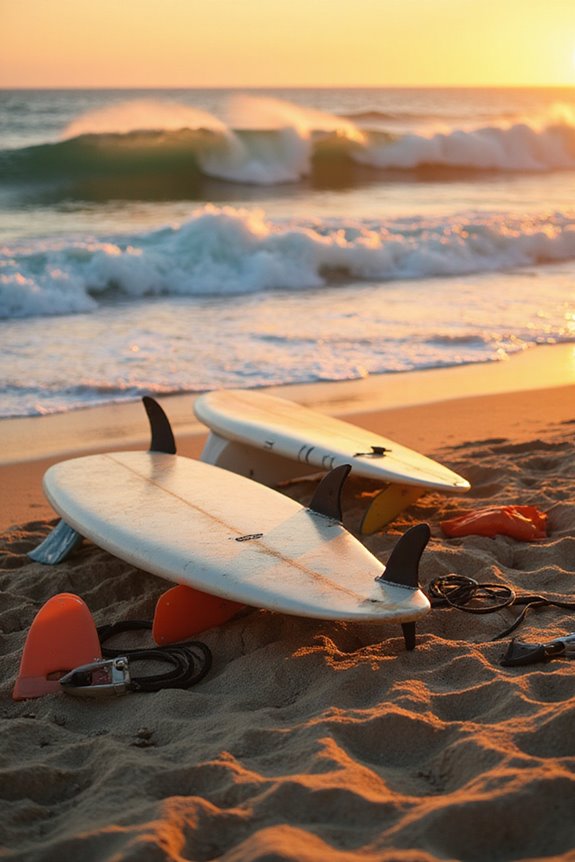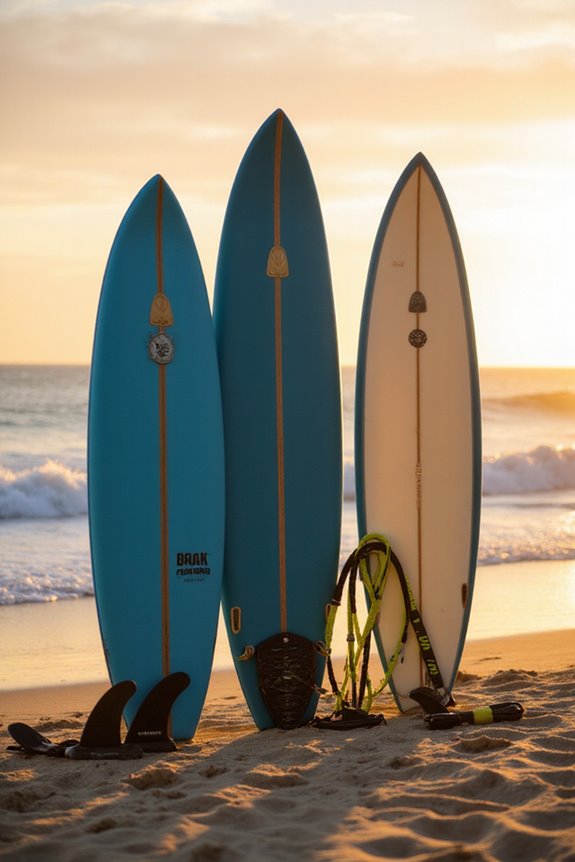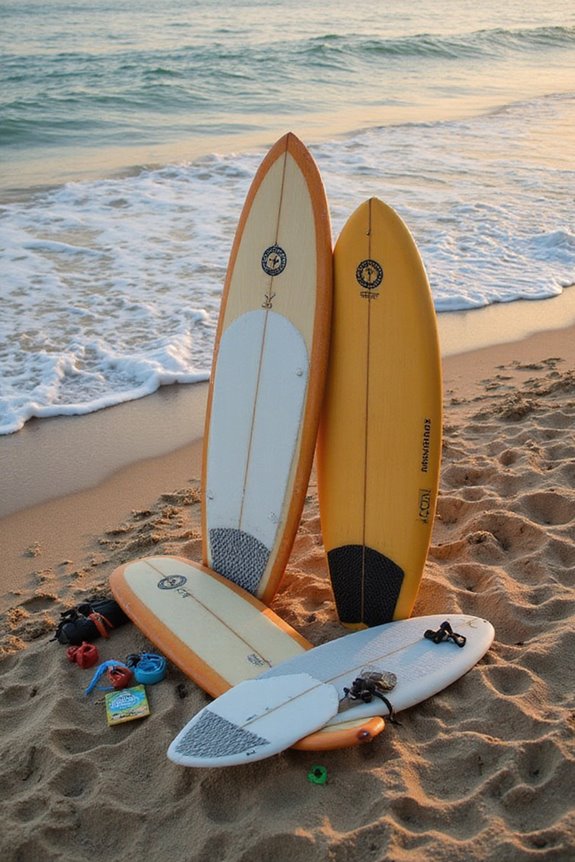When selecting a surf instructor, we should prioritize their certifications and experience. Look for qualifications like ISA Level 1 or WB Surf Camp Level 1, along with a solid surfing background of at least two years. It’s essential they demonstrate strong safety skills, effective communication, and a positive reputation among past students. Additionally, ongoing development and safety training should also be confirmed. If we explore more aspects of their qualifications, we can find the ideal instructor for our needs.
Key Takeaways
- Look for instructors with recognized certifications, such as ISA Level 1 or WB Surf Camp Level 1, ensuring they meet safety and competency standards.
- Check for a minimum of two years of surfing experience, indicating mastery of essential techniques and adaptability in various conditions.
- Ensure they prioritize safety with current CPR/First Aid certifications and knowledge of local surf hazards and emergency protocols.
- Seek instructors who communicate effectively, adapting their style to meet individual student needs for better understanding and engagement.
- Consider positive feedback from past students and their involvement in the local surf community to assess credibility and trustworthiness.
Certification and Qualifications
When considering a career as a surf instructor, it’s essential to understand the necessary certifications and qualifications. Common instructor certifications include ISA Level 1 & 2 and WB Surf Camp Level 1. To obtain ISA Level 1, candidates must be at least 18 years old, demonstrate surfing competency, and complete online theory along with practical hours. WB Surf Camp Level 1 requires CPR/First Aid certification, two years of surfing experience, and passing both written and practical exams. Additionally, both certifications mandate documented practical teaching hours, such as 20 hours under supervision for ISA Level 1. As we pursue this career, familiarizing ourselves with these qualification requirements is vital for our success as surf instructors. Furthermore, having knowledge about the importance of safety measures can greatly enhance the effectiveness of instruction provided.
Surfing Competency and Safety Skills
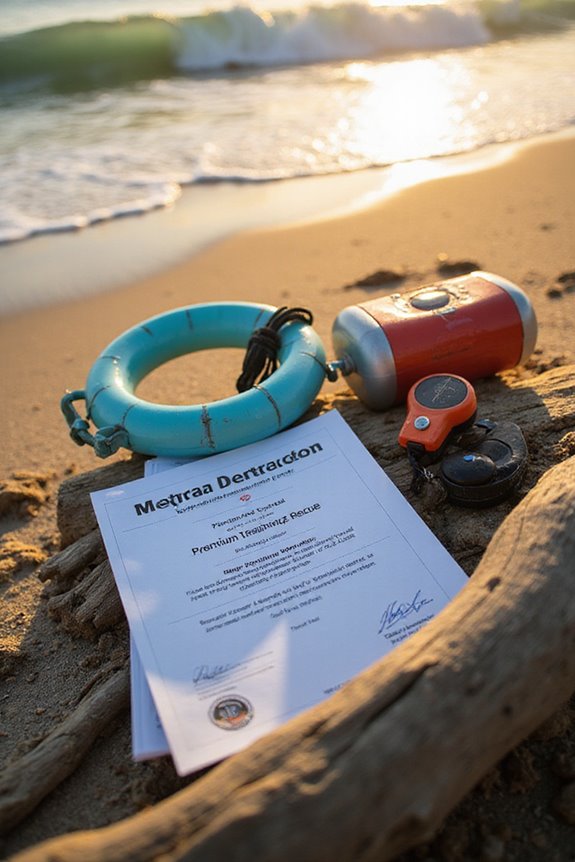
To excel as surf instructors, we must not only demonstrate strong surfing skills but also prioritize safety in the water. Proficiency in essential surf techniques, like paddling effectively and performing wave negotiation methods such as duck dives or turtle rolls, is vital for handling varying surf conditions.
We should also be skilled in taking off on unbroken waves, executing bottom turns, and exiting waves safely without losing board control.
Additionally, we must maintain water safety expertise by being aware of surf hazards, coordinating with water safety teams, and educating participants about local risks. This thorough understanding helps guarantee both our safety and that of our students, making our surf sessions enjoyable and secure. Furthermore, instructors with lifeguard certification can enhance the safety of surf lessons while providing peace of mind to students and their families.
Instructional Skills and Communication
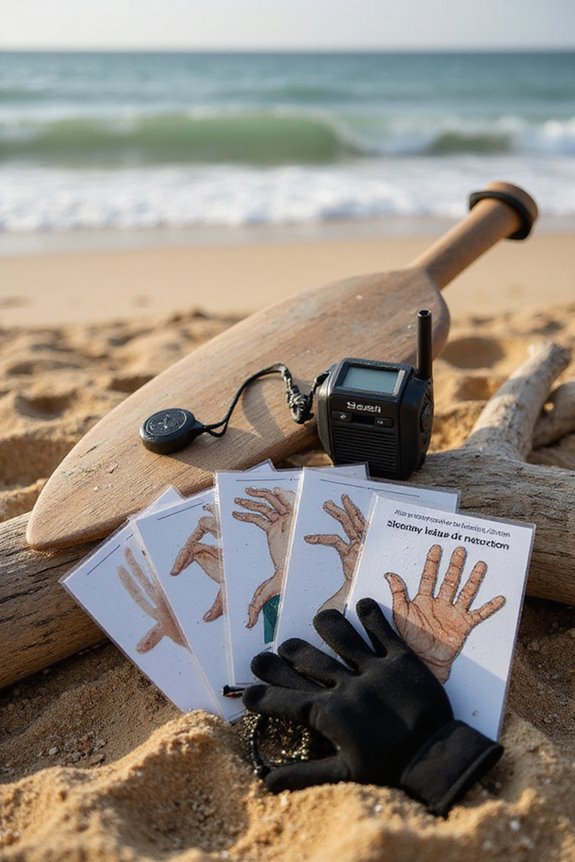
Effective communication is essential in surf instruction, as it directly impacts student understanding and safety. We should look for instructors who demonstrate instructional clarity, using clear and concise language tailored to each student’s experience level. Commands must be straightforward to support rapid comprehension and response, which is imperative in the water.
In addition, effective feedback strategies are significant. Instructors should focus on providing constructive feedback, recognizing student efforts before offering suggestions for improvement. They should adapt their communication style based on individual student needs, promoting an open dialogue to encourage questions. Utilizing both verbal commands and non-verbal cues, such as hand signals, helps guarantee that instructions are understood, especially in distracting environments. Additionally, instructors should have a strong understanding of local surf etiquette to ensure a respectful atmosphere and enhance safety for all participants.
Personal Experience and Reputation
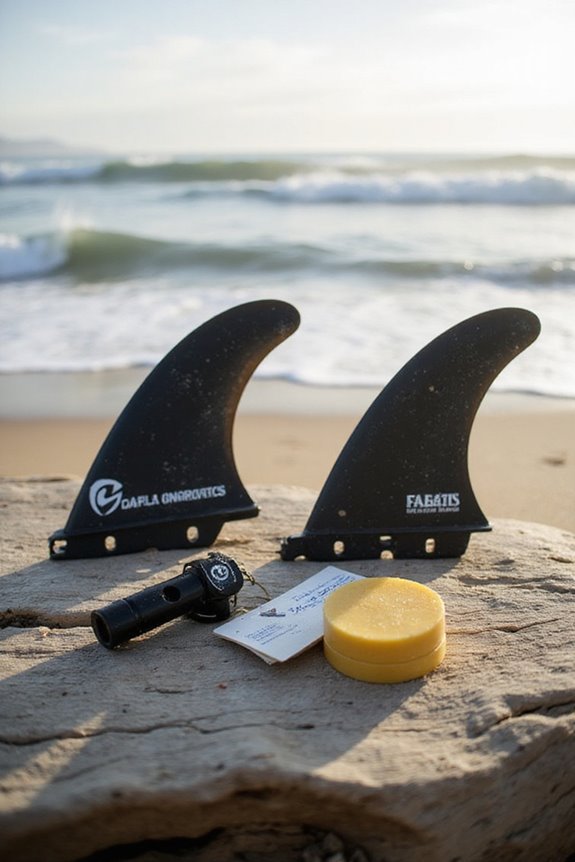
Having a solid foundation of personal surfing experience is vital for surf instructors, as it directly influences their teaching effectiveness and credibility. We should seek instructors with at least two years of surfing experience, demonstrating mastery in techniques like wave selection and traversing. Their adaptability to various ocean conditions signifies quality instruction.
Furthermore, reputation in the surf community is significant. Positive instructor feedback from past students and associations with reputable surf schools enhance credibility. Engaging in community events or competitions can also build trust. Checking online reviews and recommendations can provide insights into an instructor’s track record. Overall, a combination of personal experience and a strong reputation helps guarantee we choose a competent surf instructor. Additionally, instructors who are familiar with local surf conditions can offer tailored advice that enhances the learning experience.
Safety Certifications and Lifesaving Training
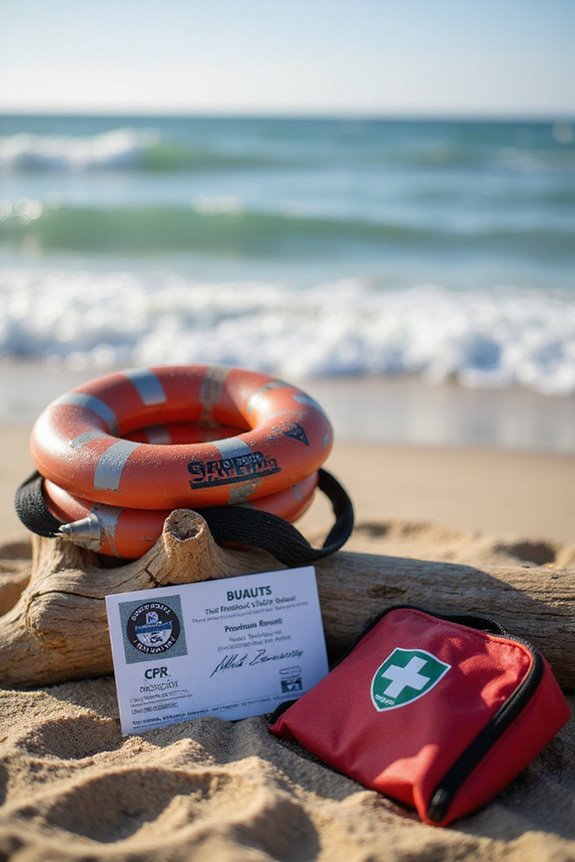
When selecting a surf instructor, we must prioritize their safety certifications and lifesaving training, as these credentials guarantee they are well-equipped to handle emergencies in the ocean. Look for instructors with valid certifications like ISA Surf Level 1 or 2, which require documented instruction hours and current water safety credentials.
In addition, they should possess advanced first aid and CPR training that focuses on ocean-specific emergency response. This includes knowledge of safety protocols, rescue techniques, and the ability to manage incidents effectively. Furthermore, instructors should understand the importance of having coverage for surfing activities, which can provide additional security during lessons.
Checking for periodic renewal of these certifications guarantees the instructor stays competent. A qualified instructor will not only enhance our surfing experience but also keep us safe in potentially dangerous situations.
Professional Standards and Code of Conduct
Professional standards and a clear code of conduct are vital components of effective surf instruction. We must prioritize ethical behavior and professional conduct to guarantee a positive experience for all participants. This includes respecting the rights and dignity of everyone, regardless of their background or beliefs.
Instructors should accurately represent their qualifications and provide transparent communication regarding costs. They need to model professionalism by avoiding conflicts of interest and refraining from public criticism of others in the sport.
Additionally, maintaining a safe environment is essential. Instructors must supervise participants closely and assure fairness in lessons. By promoting sportsmanship and resolving conflicts impartially, instructors can foster a supportive atmosphere where all surfers can thrive. Moreover, they should be well-versed in surf etiquette, which ensures respectful interactions with other surfers and contributes to a positive learning environment.
Ongoing Development and Training
Ongoing development and training are essential for surf instructors to guarantee they remain effective and knowledgeable in their roles. To achieve this, instructors participate in mentorship programs, shadowing experienced coaches for hands-on learning. This experience typically involves at least 20 logged hours, focusing on skill progression, lesson planning, and safety monitoring.
Instructors also need to renew certifications periodically, ensuring they stay updated on safety and coaching standards. Online modules and blended courses provide theoretical knowledge on various coaching methods. Additionally, regular feedback sessions help identify strengths and areas for improvement, supporting continuous growth. Ultimately, investing in ongoing training allows instructors to better serve their students and enhance their overall teaching effectiveness.
Frequently Asked Questions
What Age Groups Can Surf Instructors Teach?
When considering age groups, we find surf instructors can teach youth programs starting from age 4, while also offering adult classes. This inclusivity guarantees everyone, regardless of age, can enjoy the thrill of surfing together.
How Do I Choose the Right Surf Instructor for My Skill Level?
When it comes to choosing the right surf instructor, we’ve got to guarantee their expertise matches our journey. For beginner surfers, a focus on basics is key, while advanced techniques await those ready to progress.
What Should I Bring to My First Surf Lesson?
For our first surf lesson, we’ll pack surfboard essentials like a soft top board and leash. Lesson preparation includes bringing appropriate swimwear, sunscreen, hydration, and a towel to guarantee we’re ready for an awesome experience.
How Many Students Are Typically in a Surf Class?
Typically, we find surf classes average 2 to 3 students, ensuring a more personalized experience. Smaller class sizes enhance our learning and safety, allowing instructors to focus on each student’s unique needs and progress.
Can I Get a Refund if I Cancel My Lesson?
Steering through refund policies is like riding a wave; timing’s everything. If we cancel our lesson in advance, we might get a refund, but understanding specific cancellation terms is essential to avoid surprises.

